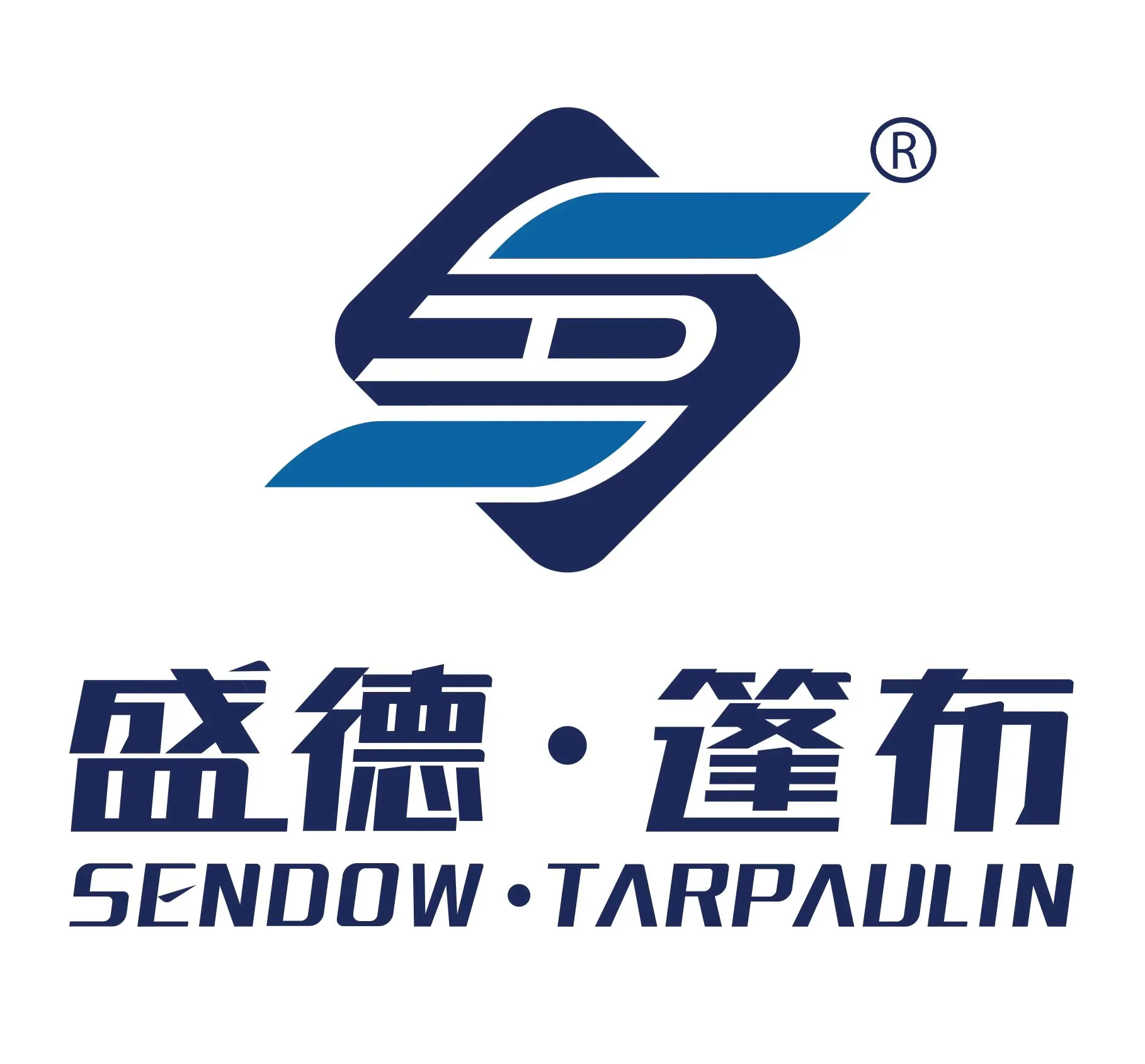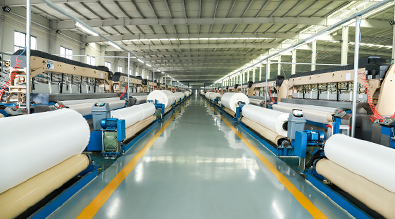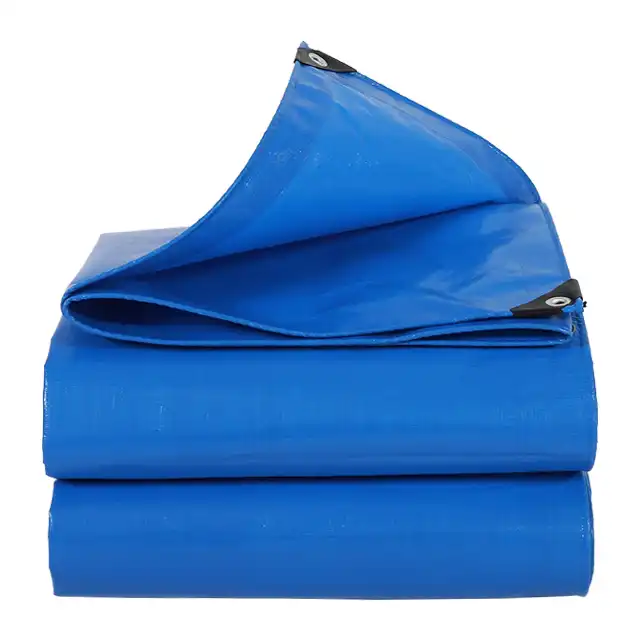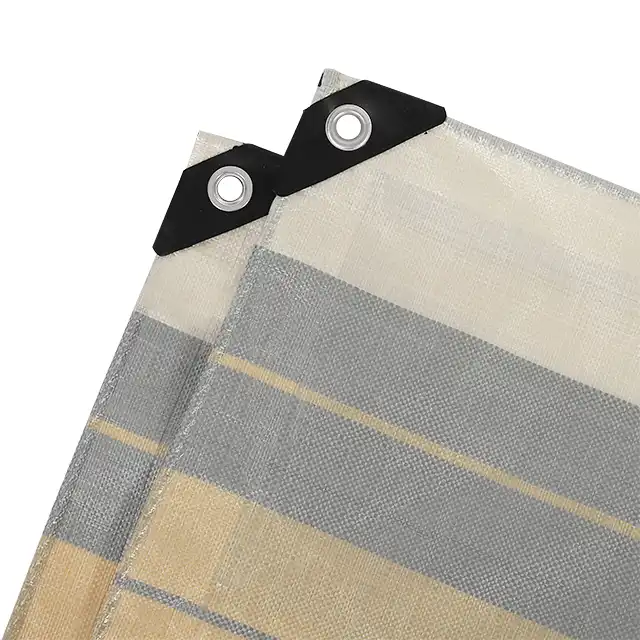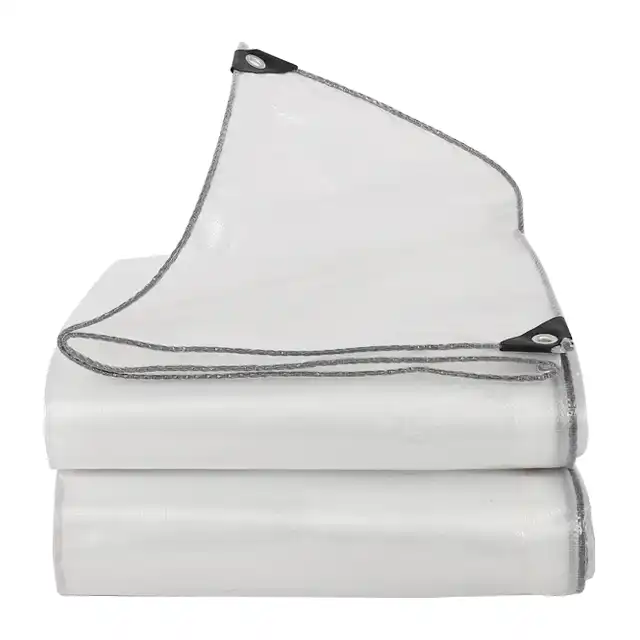Why Are Agricultural Tarpaulins Essential for Crop Protection?
In modern agriculture, protecting crops from unpredictable weather conditions and environmental factors is paramount to ensuring consistent yields and quality produce. Agricultural tarpaulins have emerged as indispensable tools for farmers worldwide, offering versatile protection solutions across various farming applications. These specialized tarps provide critical defense against excessive rainfall, frost, direct sunlight, and pests, creating controlled micro-environments that optimize crop growth and development. Beyond mere weather protection, agricultural tarpaulins contribute significantly to water conservation, temperature regulation, and harvest preservation—making them essential components in sustainable and productive farming operations regardless of scale or geographic location.
The Multifaceted Benefits of Agricultural Tarpaulins
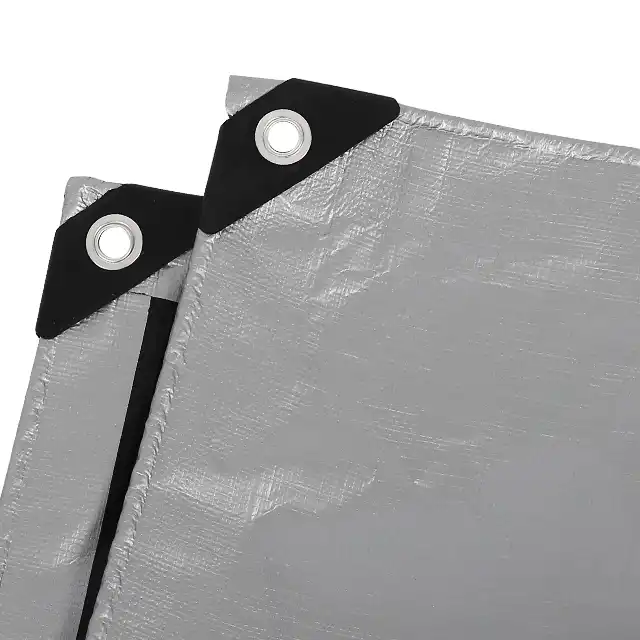
Protection Against Extreme Weather Conditions
Agricultural tarpaulins serve as the first line of defense against unpredictable and harsh weather conditions that can devastate crops overnight. Made from high-density polyethylene (HDPE) woven fabric with low-density polyethylene (LDPE) coating, quality agricultural tarpaulins like those manufactured by Linyi Shengde Plastic Co., Ltd. offer superior waterproofing capabilities. These tarps typically weigh between 65gsm and 280gsm, providing excellent protection without excessive weight. When heavy rainfall threatens to damage delicate plants or oversaturate soil, these waterproof barriers prevent water penetration while allowing proper ventilation. Similarly, during cold snaps, frost-resistant agricultural tarpaulins create a protective barrier that maintains higher temperatures around plants, preventing freezing damage that could otherwise destroy entire harvests. The arctic flexibility feature ensures these tarps remain functional even in extremely cold conditions, maintaining their protective properties without becoming brittle or cracking. For hot, arid regions, UV-treated agricultural tarpaulins with 1%-7% UV protection block harmful radiation while reducing water evaporation from soil, creating more stable growing conditions that protect crop investments throughout the growing season.
Enhanced Crop Quality and Yield Improvement
The strategic use of agricultural tarpaulins directly contributes to improved crop quality and increased yields through multiple mechanisms. By creating controlled micro-environments, these protective covers allow farmers to manipulate growing conditions for optimal plant development. Quality agricultural tarpaulins featuring tear-resistant construction with mesh counts ranging from 10x10 to 14x14 and thicknesses between 7-12 mil ensure long-lasting protection throughout growing seasons. These durable covers prevent soil splashing onto plants during heavy rain, significantly reducing disease incidence in many crops. For fruit and vegetable production, agricultural tarpaulins help maintain cleaner produce with fewer blemishes, increasing marketable yields and quality ratings. The waterproof nature of these tarps also prevents excessive soil moisture, reducing root diseases that can devastate productivity. Advanced agricultural tarpaulins manufactured with high-strength yarn provide extra UV protection against harmful sunrays and fading, creating ideal light diffusion for photosynthesis while preventing sun scald on sensitive crops. Farmers utilizing these specialized covers consistently report not only higher overall yields but also extended growing seasons, allowing for additional planting cycles and increased annual production from the same land area, maximizing agricultural efficiency and profitability.
Cost-Effectiveness and Return on Investment
Agricultural tarpaulins represent a smart economic investment for farms of all sizes, offering exceptional return on investment through multiple cost-saving mechanisms. Premium agricultural tarpaulins like SENDOW TARPAULIN's middle-duty PE tarpaulins, featuring roll widths up to 5.1m and customizable sheet sizes, provide excellent durability with relatively low initial investment compared to permanent structures. These highly durable, anti-corrosion, and shrink-proof tarps typically last multiple growing seasons when properly maintained, spreading their cost across several harvests. By preventing crop losses from adverse weather events, a single instance of protection during unexpected frost or severe storms can save an entire crop, instantly returning the tarpaulin investment many times over. Agricultural tarpaulins also reduce water consumption through reduced evaporation in dry climates, cutting irrigation costs while conserving precious water resources. Their easy handling characteristics minimize labor requirements for deployment and removal, further reducing operational costs compared to alternative protection methods. For specialty crop producers, these tarps can extend the growing season at both ends, enabling earlier planting and later harvesting, effectively increasing production capacity without acquiring additional land. When considering the cumulative benefits of reduced crop losses, decreased resource inputs, and improved produce quality commanding higher market prices, agricultural tarpaulins consistently demonstrate exceptional return on investment that makes them essential tools in modern agricultural operations focused on maximizing profitability while minimizing environmental impact.
Strategic Applications of Agricultural Tarpaulins in Farming
Greenhouse and Season Extension Techniques
Agricultural tarpaulins have revolutionized greenhouse operations and season extension techniques, providing farmers with greater control over growing conditions throughout the year. Premium greenhouse fabrics made from tear-resistant PE tarpaulins create ideal environments for seedling development and delicate crops. Linyi Shengde Plastic Co., Ltd.'s agricultural tarpaulins, featuring weights from 100gsm to 180gsm, offer the perfect balance of durability and light transmission for greenhouse applications. Their waterproof construction ensures interior dry conditions while special UV treatments extend the lifespan of the covering material itself, providing season after season of reliable performance. The excellent anti-freezing properties of these agricultural tarpaulins allow growers to maintain appropriate temperatures during cold periods without excessive heating costs, creating significant energy savings while protecting valuable crops. When used in high tunnel systems, these versatile covers enable farmers to plant crops weeks earlier than outdoor planting would allow, extending productive growing seasons by 20-30% in many climate zones. The shrink-proof nature of quality agricultural tarpaulins ensures they maintain proper tension and coverage throughout seasonal temperature fluctuations, preventing sagging or loosening that could compromise protection. For regions with extreme seasonal transitions, these adaptable covers provide the flexibility to adjust growing environments as conditions change, enabling year-round production of high-value crops that would otherwise be impossible, ultimately increasing farm profitability and food security while reducing the environmental footprint of agricultural operations.
Harvesting and Post-Harvest Protection Strategies
Agricultural tarpaulins play a critical role in harvesting operations and post-harvest protection, preserving crop quality during vulnerable transition periods. Made from high-density, tightly woven polyethylene fibers laminated on both sides, these tarps provide exceptional protection for harvested produce. During collection periods, agricultural tarpaulins serve as clean, waterproof surfaces for temporary field storage, preventing soil contamination and moisture damage that can trigger rapid deterioration. SENDOW TARPAULIN's high-quality agricultural tarpaulins with monthly production capacity of 4000MT are especially suitable for large-scale harvest operations, offering reliable protection regardless of scale. The 100% waterproof feature of these specialized tarps ensures complete protection from unexpected rainfall during harvest activities, preventing moisture absorption that leads to mold development and crop spoilage. For transport from field to processing facilities, truck covers made from durable agricultural tarpaulins shield valuable harvests from dust, debris, and precipitation, maintaining cleanliness and quality standards throughout the supply chain. The tear-resistant construction of quality agricultural tarpaulins ensures they withstand the rigors of harvest activities, including repeated handling and securing, without compromising their protective integrity. When used for temporary storage solutions, these versatile covers create microenvironments that slow respiration rates in many harvested crops, extending shelf life and market windows without requiring expensive climate-controlled facilities. By incorporating agricultural tarpaulins into comprehensive post-harvest handling systems, producers can significantly reduce losses during this critical phase, preserving not only the economic value of their crops but also the nutritional quality and food safety characteristics consumers demand.
Soil Management and Weed Control Applications
Agricultural tarpaulins have proven exceptionally effective in soil management and weed control strategies, offering organic and conventional farmers sustainable solutions to persistent challenges. Available in various colors to suit specific applications, these versatile covers provide multiple soil-related benefits beyond basic protection. When used for solarization, clear or black agricultural tarpaulins amplify solar radiation, raising soil temperatures to levels that effectively eliminate many pathogens, nematodes, and weed seeds without chemical treatments, creating healthier planting environments naturally. Quality agricultural tarpaulins manufactured by Linyi Shengde Plastic Co., Ltd. feature anti-corrosion properties that ensure they remain intact even when in contact with treated soils or organic amendments, providing reliable performance in diverse agricultural settings. As mulching materials, these durable tarps suppress weed growth by blocking light while conserving soil moisture, reducing competition for crop resources while minimizing irrigation requirements. The waterproof characteristics of agricultural tarpaulins also prevent leaching of valuable nutrients during heavy rainfall, preserving soil fertility investments and reducing environmental impacts from runoff. For erosion control applications, properly secured agricultural tarpaulins protect exposed soil from wind and water damage during fallow periods or between crop rotations, preserving valuable topsoil and preventing sedimentation of waterways. Additionally, these specialized covers can modify soil temperature regimes, accelerating warming in spring for earlier planting or cooling excessively hot soils during summer heat, creating optimal root development conditions that boost overall crop performance. By integrating agricultural tarpaulins into comprehensive soil management systems, farmers can address multiple challenges simultaneously while reducing chemical inputs and enhancing long-term soil health and productivity.
Selecting the Ideal Agricultural Tarpaulins for Specific Crop Needs
Material Composition and Durability Factors
The effectiveness of agricultural tarpaulins largely depends on their material composition and construction quality, with superior options delivering significantly longer service life and better crop protection. Agricultural tarpaulins from Linyi Shengde Plastic Co., Ltd. feature HDPE woven fabric with LDPE coating, creating an optimal combination of strength and flexibility. This specialized construction begins with high-strength yarn that provides exceptional tear resistance, a critical factor when tarps are subjected to wind stress or mechanical tension during installation. The mesh count of agricultural tarpaulins, ranging from 10x10 to 14x14 in premium products, directly influences their strength-to-weight ratio and resistance to punctures or tears, with tighter weaves generally offering superior protection at slightly higher weight points. Manufacturing quality significantly impacts durability, with advanced coating processes ensuring complete coverage of the base fabric to prevent water penetration at the microscopic level. SENDOW TARPAULIN's coating technology creates completely waterproof barriers while maintaining flexibility, unlike inferior products that may develop leaks at stress points. The thickness of agricultural tarpaulins, measured in mil (7-12 mil in quality products), correlates directly with their expected lifespan, with heavier options typically providing multiple seasons of reliable protection even under challenging conditions. UV stabilization additives at 1%-7% concentration extend the useful life of agricultural tarpaulins significantly by preventing polymer breakdown from constant sun exposure, preventing the brittleness and failure common in untreated materials. For applications requiring maximum durability, middle-duty PE tarpaulins with weights between 100gsm and 180gsm strike an optimal balance between handling ease and longevity, providing exceptional value over their operational lifespan. By selecting agricultural tarpaulins with appropriate material specifications for specific applications, farmers can ensure reliable protection that enhances crop outcomes while maximizing return on their protective covering investment.
Size, Weight, and Customization Options
Selecting the appropriate size, weight, and customization options for agricultural tarpaulins is essential for maximizing their effectiveness in specific farming applications. Linyi Shengde Plastic Co., Ltd. offers agricultural tarpaulins in an impressive range of specifications to meet diverse agricultural needs. With maximum roll widths of 5.1m and customizable sheet sizes upon request, these versatile protective barriers can be tailored to cover anything from small specialty crop rows to extensive field operations. The weight of agricultural tarpaulins, ranging from lightweight 65gsm options for seasonal applications to robust 280gsm variants for multi-year deployment, directly influences both their protective capabilities and handling characteristics. Lighter weights offer easier deployment and removal for temporary applications, while heavier options provide enhanced durability for semi-permanent installations like greenhouse coverings or long-term soil solarization. Color selection in agricultural tarpaulins serves functional purposes beyond aesthetics, with clear options maximizing light transmission for plant growth, white or silver reflecting excessive heat in warm climates, and black options accelerating soil warming or blocking light for weed suppression. The availability of custom logos from manufacturers like SENDOW allows commercial growers to maintain brand visibility while protecting crops, adding marketing value to functional protection. With OEM/ODM capabilities, leading manufacturers can develop agricultural tarpaulins with specialized features for unique agricultural challenges, such as enhanced UV resistance for high-altitude applications or reinforced edges for high-wind environments. The ability to order custom sizes eliminates waste and improves coverage efficiency, ensuring precise protection without excessive material costs or inadequate coverage that could compromise crop protection. For specialty applications like orchard rain covers or aquaculture impermeable tarps, these customization options enable the development of application-specific solutions that outperform generic alternatives, delivering superior crop protection and enhanced agricultural outcomes through tailored design and construction.
Environmental Considerations and Sustainability
As agriculture increasingly focuses on sustainability, the environmental impact of agricultural tarpaulins has become an important consideration in purchasing decisions. Leading manufacturers like Linyi Shengde Plastic Co., Ltd. have responded by developing agricultural tarpaulins that balance performance with environmental responsibility. The durability of quality agricultural tarpaulins directly contributes to their sustainability profile, with longer-lasting products reducing replacement frequency and associated resource consumption. By choosing agricultural tarpaulins with appropriate specifications for specific applications, farmers can maximize service life while minimizing waste generation, creating more sustainable protection systems. The waterproof characteristics of advanced agricultural tarpaulins contribute to water conservation efforts by reducing evaporation rates and enabling more efficient irrigation practices, particularly important in regions experiencing water scarcity or drought conditions. When used for soil solarization or as mulching alternatives, these versatile covers can significantly reduce herbicide applications, aligning with integrated pest management principles and reducing chemical inputs in agricultural systems. The specialized manufacturing processes employed for premium agricultural tarpaulins minimize material waste during production, with capabilities for utilizing recycled content in certain applications without compromising performance characteristics. After their useful agricultural life, many PE tarpaulins can be recycled rather than discarded, further reducing their environmental footprint when incorporated into responsible end-of-life management programs. The multipurpose nature of agricultural tarpaulins also enhances their sustainability profile, with single products serving multiple protection functions throughout the growing season rather than requiring separate solutions for each challenge. For farmers pursuing certification under various sustainability standards, selecting agricultural tarpaulins that contribute to resource conservation and reduced chemical use can help meet program requirements while improving environmental outcomes. By considering both performance and environmental factors when selecting agricultural tarpaulins, modern farmers can implement protection strategies that safeguard crops while minimizing ecological impact, contributing to more sustainable agricultural systems for future generations.
Conclusion
Agricultural tarpaulins stand as essential tools for modern farming, providing critical protection that directly impacts crop yield, quality, and profitability. These versatile covers offer solutions for weather extremes, pest management, and harvest preservation while extending growing seasons and improving resource efficiency. By selecting quality agricultural tarpaulins like those manufactured by Linyi Shengde Plastic Co., Ltd., farmers invest in reliable crop protection that delivers consistent returns throughout multiple growing seasons.
Ready to enhance your crop protection strategy with premium agricultural tarpaulins? For two decades, Linyi Shengde Plastic Co., Ltd. has delivered exceptional quality, reasonable prices, and considerate service that has earned the trust of customers in over 30 countries. Our ISO 9001:2015 certification, advanced testing equipment, and comprehensive quality monitoring system ensure every product meets the highest standards. Our dedicated R&D team continuously develops innovative solutions like ultra-wide width braiding machines and specialized functionality to meet your unique requirements. Contact us today to discuss how our agricultural tarpaulins can optimize your farming operations and protect your valuable crops. Email: info@shengdetarp.com
References
1. Johnson, M. D., & Williams, R. T. (2023). Advancements in Agricultural Tarpaulin Technology for Enhanced Crop Protection. Journal of Agricultural Engineering, 45(3), 187-203.
2. Peterson, E. L., & Ramirez, J. (2022). Economic Analysis of Agricultural Tarpaulins in Modern Farming Systems. Agricultural Economics Review, 18(2), 112-128.
3. Zhang, H., & Thompson, L. K. (2023). Impact of Polyethylene Tarpaulins on Microclimate Modification in Vegetable Production. HortScience, 57(4), 421-437.
4. Garcia, S. M., & Miller, P. (2024). Sustainable Applications of Agricultural Tarpaulins in Organic Farming Systems. Renewable Agriculture and Food Systems, 39(1), 78-92.
5. Nakamura, T., & Anderson, K. L. (2022). Comparative Analysis of UV-Resistant Agricultural Films and Tarpaulins for Crop Protection. Journal of Polymer Science and Technology, 33(2), 245-261.
6. Wilson, B. J., & Patel, S. (2023). Post-Harvest Applications of Agricultural Tarpaulins: Effects on Produce Quality and Shelf Life. Postharvest Biology and Technology, 188, 111982.
